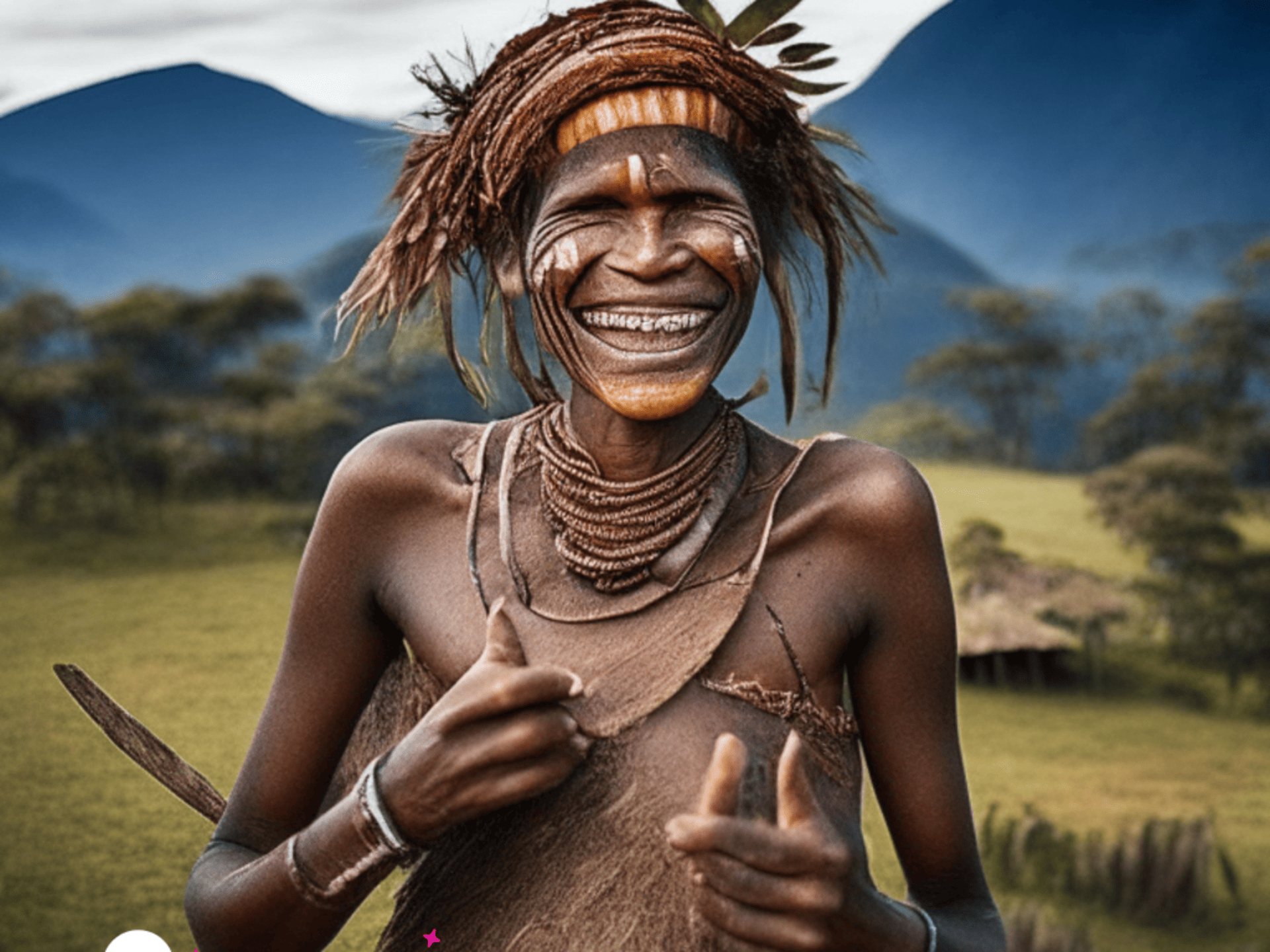Aroba bit into her husband’s hand, refusing to let go. The women gasped; the men rose to defend him. Kogoya tried pulling away, but Aroba’s teeth were holding on to the flesh on his palm.
“Haiya! She is back! The spirit, Yumbo!”
People drew back in horror. Blood began tricking down Kogoya’s wrist, and he howled. The women shuddered; the men recoiled. In the village square dotted with banana trees, under the teal blue sky, I saw the face of every human darken. The spirit was back.
An old man, lean and pale, his neck adorned with bird feathers of all colours came forward. I knew him. He was the manik, the wise-old man. He mumbled under his breath, “Bring the matoa.”
Hearing him, I licked my lips. In that brief moment, Kogoya pried open Aroba’s grinding teeth and freed his mauled palm.
Aroba ran after him, but he had rushed into his honai, shielded from sight. A woman got the matoa in a bowl. I greedily eyed the ripe, reddening fruit.
Aroba grabbed the bowl, biting into the sweet-sour fruit with relish. How I wished I could taste it! I guess ghosts are not as lucky as the women they possess! I leapt out of her body. Aroba passed out and fell to the mud floor.
The villagers dispersed, only to gather in Kogoya’s home. I stood by the door, with my ear to the bamboo walls.
“It has been a year since the last Ikipalin. No woman has given away her fingertip in honour of the dead. How will the spirits rest in peace? What if they come to haunt us, or worse, our pigs? A beefy young man in a long koteka(penis guard) spoke out.
Kogoya fumed, even as an old woman dressed his wounded hand with herbs. “How will the spirit of my poor mother free itself from this world if that wretched woman refuses to give her finger? Not like I have sisters!”
The manik spoke, “The real question is, whose spirit is this one? Someone who possesses a woman the moment we attempt to sacrifice her finger. A violent soul, no doubt. The way these women charge!”
I stifled a laugh. Are ghosts of docile, pious women allowed not to be wicked?
A murmur went down the tiny crowded room. Women averted gazes; men sighed. A hand slowly went up at the back of the room.
A knot rose in the pit of my stomach, as I saw Sani, my husband, slowly rise.
“My wife, Sela, loved the matao.”
The murmurs in the room travelled all the way up to the front, where the manik was seated.
“She did die over a year back, alright.”
“She lost all fingers but one.”
“Eh! Who would have thought!”
“How is he certain? She was a timid woman. Could her spirit be so ferocious?”
I stared down at my hands, with fingers spread out. Physical sacrifice leaves a mark, even after death. There only remained stubs for all fingers but one, the left little finger. Each time, the same story. The death of a loved one. And the loss of a fingertip.
Our ancestors believed, and hence, we believe. Giving away a part of our body helps us remember and cope with the loss of a dear one. And it helps the spirit of the departed float away free.
The first time, I was a little girl of eight. One of my sisters died of a nasty fever, and I felt someone ripped away a piece of my soul. Giving up a fingertip only seemed justified. My father gently took my hand. He tied a piece of thread tight around the joint close to the tip of my right index finger. So tight, it hurt. So tight, it went numb. And blue. And fell off, weeks later. My mother treated the stub by charring it over a lamp flame. And dressed it with herbs. I remember, I wept. For my sister alone. And my mother hugged me, for being a brave girl.
I learnt to live without my sister. To weave baskets by clasping grass blades between my thumb and middle finger, the stump of my index finger stretched all the while, to keep it out of the way. To tend to cassava crops. To feed the pigs to fatten them for the big feast.
At the feast, my drunkard brother got into a brawl. A war between the tribes led to his death. And I lost one more finger. A little reluctantly, this time around. I grieved my brother a lot less. My mother dressed my stump and hugged me less tightly.
I learnt life was hard. And harder with fewer fingers. I was thirteen then. I wondered if I really wanted to set my mother’s spirit free. I doubted if Mother needed my fingertip. I am certain, her spirit wept with me, for my pain. She had lost three fingers in her lifetime.
A year later, I was married. To Sani, a bull of a man. Gentle when sober, and a beast when drunk. I had a child every summer thereafter, for a decade. All sons. And the women beamed. Meyowame, blessed woman, I was called.
I lost four of my boys. To a rattlesnake, a war, and disease. And I lost fingers too. Sani lopped them off when I resisted. I never screamed, only whimpered. The last time, he caught me muttering aloud,
“He lost a child too. Why not his finger?”
He replied by biting off my fingertip.
Fortunately, I did not lose another finger- I died in childbirth. And took my newborn daughter with me. Lest she pays for my death with her finger…
The voice of the manek broke my reverie,
“Why does Sela’s spirit linger, when we have fended off those of great warriors in the past?”
I heard a woman whisper, “She only had sons. No one ever gave up a finger for her soul.”
[zombify_post]








